
Kampala, Uganda | THE INDEPENDENT | Government has shelved plans to liberalize the pension sector and will instead amend the National Social Security Fund (NSSF) Act Cap 222.
According to the proposals in the National Social Security Fund Amendment Bill, 2018 to be tabled soon in parliament, NSSF will retain its monopoly as Uganda’s Basic National Scheme. The proposed amendments by cabinet will make it a mandatory scheme for all Ugandans in the formal and informal sectors.
Another decision that will be popular with many that are saving with NSSF, is that the fund will now be allowed to provide for mid-term access of voluntary benefits.
This new Cabinet position “renders the Retirement Benefits Sector Liberalization Bill 2011 before Parliament irrelevant”, government said. The Bill will now be withdrawn.
The decision was revealed by Minister of Gender Labor and social development Janat Mukwaya in a press statement on Tuesday. Cabinet made the decision at their Monday meeting.
Minister Mukwaya said the decision by cabinet to retain NSSF as the sole recipient of mandatory contributions of Workers was because “opening up mandatory contributions to competition would complete the surrender of both the banking and non-banking financial sector to foreign capital because indigenous firms will have a very limited role to play.”
She said NSSF has demonstrated steady progress in its performance. Its total assets today stand at about Sh 9 trillion.
The amendments will make NSSF a mandatory Social Security Scheme for all Ugandans employed both in the formal and informal sectors, mandated to provide the basic social guaranteed benefits, except for Ugandans employed in the Public Service. (CLICK TO READ THE CURRENT NSSF ACT 1985)
According to government, the new amendments to the NSSF Act 1985 will aim to expand social security coverage and enhance efficiency and effectiveness in investment.
The amendments will also enable NSSF to make independent investment decisions and transform the fund from a Provident Fund offering lump sum benefits to a hybrid Scheme offering both lump sum and pensions.
Amendments will be made to also provide for appointment of the Managing Director and Deputy Managing Director by the Minister on recommendation of the Board while persons over the age of 60 years shall not pay tax on their benefits.
NSSF contributions to hit Shs 9 trillion soon https://t.co/qZDwRb9wrd pic.twitter.com/Hr6rMa9rNi
— The Independent (@UGIndependent) February 18, 2018
****
Highlights of the Pension Reform Bill tabled in parliament in 2011 (read full bill on Pg 2)
- End monopoly of the National Social Security Fund (NSSF)
- Pay monthly pension instead of lump-sum provident on retirement
- Allow those who have saved money for more than 10 years to access 30% of their savings to secure mortgages or loans from any financial institution
- Convert the public service pension scheme from a defined benefit scheme (where no contributions are made by the civil servant) to a defined contribution scheme (where both the government and the civil servants make contributions to the scheme)
- Increase coverage to all formal sector workers (removing the 5+ cap) under the NSSF arrangement. This would expand pension coverage that is currently at 5%, according to the World Bank’s Uganda Economic Update for 2017
 The Independent Uganda: You get the Truth we Pay the Price
The Independent Uganda: You get the Truth we Pay the Price





